
























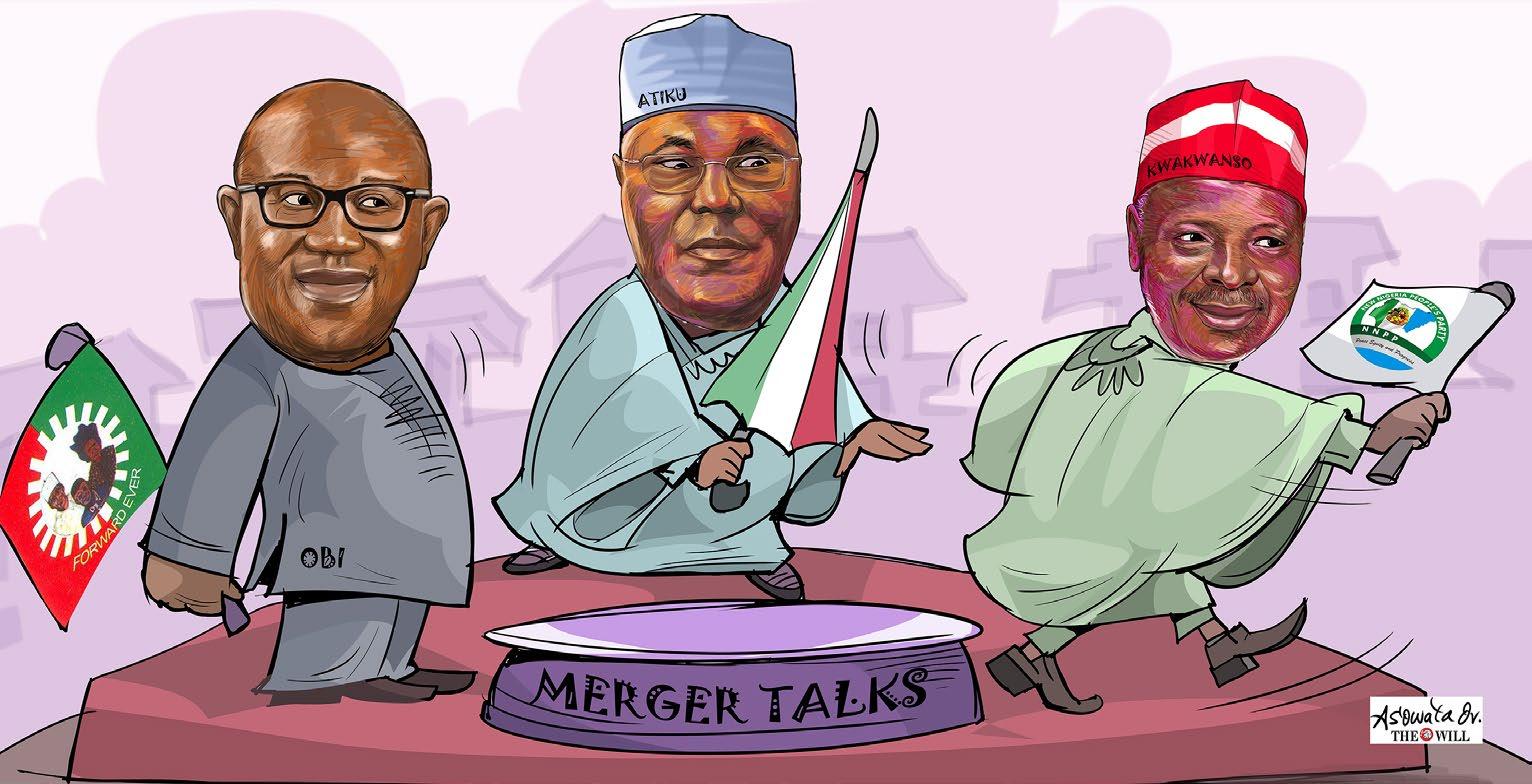


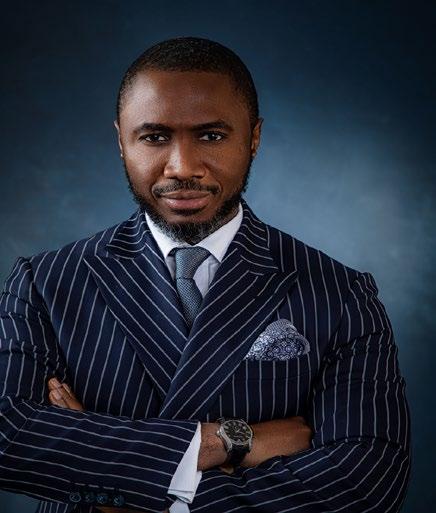





Taopheek Babayeju’s career started twenty-four years ago when he served as a National Youth Service Corps (NYSC) member at the defunct Mtel. After that, he worked briefly at Sony Ericsson as a service centre manager, and then he and a friend set up a company, but it failed. Failing didn’t deter Babayeju, as he summoned the courage to set up another company— a gadget service centre, from which he made his first million. He then travelled to the UK Telecoms Academy to fulfil his dream of becoming a telecoms engineer. Upon his return, Mtel called and offered him a position as project engineer. And that was the beginning of his love for project management. By 2009, he held the first project management conference in Nigeria and the same year, he established his company, iCentra. In 2019, he established another branch of his company in Texas to serve the North American market, and last year, he was named the Project Management Institute Global Person of The Year.
Read more about Taopheek Babyeju on pages 8 through 10.
A short black skirt can be worn formally or to a casual get-together. However, your shoes can make or break the outfit. Our fashion pages show you six types of shoes you can wear with a short black skirt and look amazing. Scroll to pages 4 and 5 for this.
It’s a new year, and as always, new movies are slated for release. We are looking forward to several of them, including Superman, Mission: Impossible—Final Reckoning, Fantastic Four: First Steps, and Captain America: Brave New World Our movie review page lists some promising movies and shows this year. I hope it gets you as excited about the releases as I am.
Until next week, enjoy your read.







SUNDAY, JANUARY 05, 2025


SUNDAY, JANUARY 05, 2025



BY AMOS ESELE
As allies, 2023 presidential candidates, former Vice President Atiku Abubakar of the Peoples Democratic Party alongside Labour Party’s Peter Obi and New Nigeria Peoples Party’s Rabiu Kwankwaso would constitute a formidable opposition to the governing All Progressives Congress, APC. But politics is not mathematics, more so in the Nigerian space noted for its fractious and fleeting politics.
Without exception, the three parties are crisis ridden. Internal leadership crisis has stalled the formal meeting of the PDP’s National Executive Committee, NEC. The prolonged leadership crisis in the LP, pitting the Nigeria Labour Congress, NLC, against the faction led by Julius Abure, was only recently resolved by the Appeal Court, which restored Abure as National Chairman, even as the warring parties are still on the warpath. The NNPP is currently split into two
factions, with Ajuji Ahmed and Boniface Aniebonam as National Chairman.
As top presidential candidates in the last poll, Abubakar, Obi and Kwankwaso still have the individual presence and charisma that commands a large followership, which also makes the slightest hint of alliance among them a big deal.
In addition to being a former two-term governor of Anambra state, former twoterm governor of Kano, senator and Minister of Defence and former Vice President of Nigeria, respectively, Obi, Kwankwaso and Abubakar have been very active politically, oiling their political machines regularly.
“The political terrain is barren at the moment. There is no serious opposition,” a professor of political science at the Lagos State University, Sylvester Odion-Akhaine told THEWILL on Friday. “An alliance

or merger of political parties is required to make incumbents sit up and govern in the interest of the people. Nigeria desperately needs institutionalised parties capable of articulating an alternative vision of development.”
Three months ago, specifically on September 16, 2024, the deputy national spokesperson of the PDP, Ibrahim Abdullahi hinted that the three prominent opposition leaders in the country were engaged in a potential merger discussion ahead of the 2027 presidential election. He said the merger talks were rooted in the widespread hardship and insecurity in the country occasioned by the policies of the Federal Government.
Speaking to the question in a national television interview, Abdullahi said, “Our concern as a party and to these people that I have mentioned is to ensure that
we salvage Nigerians from this despair and despondency, between hunger and frightening insecurity in the land. I am telling you clearly: Peter Obi is suitably qualified; he can aspire and we will support him if he gets the ticket. Atiku Abubakar is suitably qualified and if he gets the ticket, we will rally behind him and give him the desired support to salvage Nigerians out of this situation.
He added that the trio of Abubakar, Obi and Kwankwaso were, “prepared to set aside personal ambitions to create a strong coalition capable of challenging the ruling APC in 2027, with the goal of rescuing Nigerians from hunger.”
Although Abdullahi spoke with certainty, events have proved him wrong. Kwankwaso, never quite in support of any such talks, went full blast in an interview with the Hausa Service of the BBC, mocking the idea and knocking the PDP to boot.
According to Kwankwaso, “I heard from a source that PDP brought in scholars— about 45 of them. They were told that I had agreed to a deal where Atiku Abubakar would serve for four years, I would serve for another four years and Peter Obi would serve for eight years. This is completely false. Such an agreement never existed.
“This issue deeply angers me — to hear that respected elders are spreading lies about something that never happened. I was told that nearly 45 clerics were gathered and informed about this fabricated story. I did not appreciate this at all. Such deceit is part of what led me and others to leave the PDP. These actions have destabilised the party.”
be put in context. “For me to accept any arrangement, we have to go back to history; I understand PDP in totality. I know their plan is to procure a party or beat around the bush in other parties, bring us together and make northerners vote for them,” Kwankwaso said.
A day after the New Year celebrations, Obi declared his stand on the issue. He denied claims that he had discussed a possible merger with the PDP, NNPP or any other political party. But unlike Kwankwaso, Obi was more cautious in choosing his words, saying that there was no such discussion.
Calling on all Nigerians to sink their differences and come together to form a unified front to challenge the ruling APC in 2027, the one-time Anambra State governor said, “There are no merger talks with any party at this moment. We must focus on unity and collective action to bring about the change Nigerians desire.”
Several months earlier, Obi had taken a similar path. He said he was not prepared to join anybody for state capture or for winning an election. All he wants and will stand for is to support any talks that prioritise education of children in the face of over 18.3 million out-of-school children in the country and production that will promote job creation and deemphasise consumption.
He had said, “We must first of all establish what we are going to achieve by coming together. Collaboration shouldn’t be for
just state capture and continuing with the same consumption. If it’s a collaboration for production, we will.”
Efforts by THEWILL to get the former Vice President’s reaction proved abortive. But a dependable source in his camp spoke to this newspaper about Abubakar and the PDP’s position on the matter. According to the source, there have been meetings and there will be meetings as the months wear on and the road to 2027 politics gets clearer. The source added that given the way and manner Kwankwaso had been describing the PDP in uncomplimentary terms, a committee advised the former Vice President to exclude him from a tripartite meeting. The committee, he said, also advised Abubakar not to respond to Kwankwaso’s statement.
“What now happens is that you have a situation where someone is not on the table of discussion and then speaks as if he knows what is going on to the point of exaggeration. I mean those who are not considered worthy to be part of the discussion, will feel left out and do everything to undermine the talks. That is my reading of Kwankwaso’s statements. Note the more cautious response of Obi to the talks,” the source said.
Talking about Obi’s tactful response, an LP presidential spokesperson and currently the National Coordinator of the ‘Obidient Movement,’ Tanko Yinusa told THEWILL that his principal is leaving the door open for discussions. There was never a time any of the political parties discussed a merger, he said, adding: “They, however, exchange pleasantries often.”


Kwankwaso, the former Kano State Governor, accused the PDP of trying to use manipulative tactics to secure northern votes in future elections and dismissed ongoing speculations of a rotational presidency pact with Atiku Abubakar and Peter Obi.
He emphasised that any future political arrangement must take into cognisance historical facts and must
What now happens is that you have a situation where someone is not on the table of discussion and then speaks as if he knows what is going on to the point of exaggeration. I mean those who are not considered worthy to be part of the discussion, will feel left out and do everything to undermine the talks
According to Yinusa, “Politics is dynamic. As time goes on anything can happen in the future because the truth is that the people that will vote are clamouring for change and their leaders will have to consider what is proper to be done.”
Offering an explanation for the collapse of any party alliance or merger, Professor Odion-Akhaine said it often happens when personal interest trump’s national interest. “Alliance should be built around a common programme,” he said. That is a poser for the trio of Atiku, Obi and Kwankwaso in the days ahead as the politics of 2027 beckons.



President Bola Tinubu greets Governor Hope Uzodinma of Imo State while Governor Babajide Sanwo-Olu of Lagos State, left, Deputy Governor of Bayelsa State, Lawrence Ewhrudjakpo, middle and Governor Babagana Zulum of Borno State, look on, during the Yuletide visit of Governors to the President in Lagos at the weekend.

The Central Bank of Nigeria (CBN) has again clarified that the 1,000 staff members who opted out of service in December 2024 were not forced to quit their jobs.
The CBN Governor, Olayemi Cardoso, stated this on Friday in Abuja at an investigative hearing of the House of Representatives’ ad-hoc committee probing the circumstances leading to the exit of the staff members and how the sum of N50 billion severance package for the affected persons was arrived at. Cardoso added that the affected persons opted to disengage through the voluntary Early Exit Program with payment of full benefits.
Represented by Deputy Director, Corporate Service of the CBN, Bala Bello, Cardoso explained. “The Early Exit Program, Restructuring and Re-organization “are basically ways and means through which the performance of an organization is optimized by ensuring that round pegs are put in right holes. The manpower requirement of the bank is actually met.
“I’m very happy to mention that the early exit programme of the CBN is 100 per cent voluntary. It’s not mandatory. Nobody has been asked to leave, and nobody has been forced to leave. It’s a completely voluntary programme that has been put in place”.
He also noted that the exercise was not restricted to government agencies alone, saying, “I believe several organisations across the world, and even within this country, both in terms of the private sector and the public sector, are undertaking similar exercises”.
Continuing, Cardoso said, “In the past, we had instances in which cases of stagnation and lack of career progression appear. In an organisation, you’ve got a pyramid where from each level to the next level, the gap keeps narrowing. If not, you are going to have a quasi-organisation, an inverted pyramid.

“It gets to the level where you have, for example, 30 departments in the Central Bank. You cannot have 60 directors manning 30 departments. It’s not going to work.
“Once those vacancies are filled, it gets to a level where some people, even though they are very qualified, able, and willing, but the vacancies are not there. And then they got to
a level where they are stagnated for a period of time”. Speaking earlier, the chairman of the committee, Bello
Kumo, noted that the committee’s responsibility was to submit the report to the House.
Eko Book Club has congratulated Jahman Anikulapo, Programme Chairman of the Committee for Relevant Art (CORA) and the organizer of the esteemed Lagos Book and Art Festival (LABAF), on his remarkable achievement of winning the UNESCO Defender of Cultural Rights Award 2024.
The International Centre for the Promotion of Human Rights (CIPDH), operating under the auspices of the United Nations Educational, Scientific and Cultural Organisation (UNESCO), said it recognized Anikulapo for his outstanding contributions to cultural preservation and advocacy. A prolific cultural archivist and the founder of Culture Caucus Advocate (CCA), Anikulapo was honored with the prestigious UNESCO Defender of Cultural Rights Award 2024.
The award ceremony which recently took place in the Montevideo Hall of the Legislature of the Autonomous City of Buenos Aires, Argentina, acknowledged Anikulapo alongside other luminaries from the fields of culture, politics, and the defense of fundamental human rights.
Eko Book Club founder, Wole Adedoyin, praised Jahman Anikulapo for his tireless dedication to the advancement of culture and the arts, particularly through his leadership of LABAF, a festival that has successfully championed literary and artistic expression for over 26 years.
“Jahman Anikulapo’s contributions to cultural advocacy have placed Nigeria’s rich heritage on the global stage. This well-deserved recognition by UNESCO is a testimony to his unwavering commitment and visionary efforts,” said Wole Adedoyin.
BY FELIX IFIJEH
Nigerian telecommunications companies have proposed a 100 percent tariff increase, seeking approval from the Nigerian Communications Commission (NCC).
Chief Executive Officer of MTN Nigeria, Karl Toriola, who disclosed this when he featured on Arise TV, said the increase is aimed at addressing rising operational costs, including inflation and increased service delivery expenses.
Toriola, who expressed uncertainty about the proposal being approved by the telecom regulator, NCC, said the hike became imperative to sustain the industry bedevilled by significant financial pressures due to rising operational costs.
“We’ve put forward requests of approximately 100 percent tariff increases to regulators. I doubt they’re going to approve that quantum of increases because they are very, very sensitive to the current economic situation in the country.
“I believe we’re all on the same side, the policymakers, the regulators, our Chairman of ALTON, Gbenga Adebayo, and the industry. We’re united because we share concerns about a few fundamental issues. First, human rights are critical to driving any economy.
“Without a sustainable industry, the broader economy and the well-being of the people will be negatively impacted”, he added.


L-R: Rivers State Governor, Siminalayi Fubura; Rivers State Commissioner for Justice, Mr. Dogogo Israel and the Majority Leader, Rivers State House of Assembly, Mr Good boy Sokari, during the signing of 2025 Budget in Port Harcourt on January 2, 2025.

BY UDEME UTIP, UYO
The Minister of State for Petroleum Resources (Gas), Rt. Hon. (Obongemem) Ekperikpe Ekpo, has hailed the leadership style of Akwa Ibom State Governor, Umo Eno, describing it as a unifying approach that has fostered collaboration between the state and federal governments.
Speaking during a media chat over the Christmas holiday, Ekpo emphasised that Governor Eno’s inclusive governance has bridged political divides, creating an atmosphere of peace and progress in the state.
According to the minister, this synergy has been instrumental in reviving dormant projects and attracting multimillion-dollar investments to Akwa Ibom in the last year.
Highlighting key achievements, Ekpo revealed that the state secured a deal with Jindal Group to offtake 450 million metric standard cubic feet per day (MMscfd) of natural gas.
This commitment will facilitate a $4 billion investment in a 10 million tonnes per annum Hot Briquetted Iron (HBI) steel plant at the Ibom Solutions Hub Industrial Park (ISHIP), a free trade zone in the state.
He also pointed to a historic agreement between BFI Group and China National Chemical Engineering Corporation to revive the Aluminium Smelter Company of Nigeria in Ikot Abasi.
The deal includes the rehabilitation of a 135 MMscfd gas processing plant, enabling ALSCON to produce
up to 300,000 tonnes of aluminum annually, thus restoring a critical industrial asset and creating jobs for locals.
Ekpo noted the partnership between 3W Alliance Limited and the Oil and Gas Free Zone Authority to develop an international industrial park at the Liberty Free Trade Zone in Ikot Abasi.
The project promises state-of-the-art infrastructure, including power and water facilities, natural gas pipelines, internal roads, warehouses, and residential estates, leveraging the state’s abundant gas resources to drive industrial growth, technology transfer, and skills acquisition.
The minister also assured that the 20,000 metric tonnes Windek Energy LPG depot at Atabrikang Aquaha in Ibeno, attracted to the state last year, will become a major source of revenue and employment upon completion.
As a call for unity, Ekpo urged Akwa Ibom residents to embrace peace and love in the new year, emphasizing that the collective development of the state transcends political affiliations.
Eno, a former pastor who recently earned a doctorate in Public Administration from the University of Uyo, has consistently urged his political supporters to set aside partisan differences and focus on governance. “Politics is over. This is the time for governance,” the governor often says, underscoring his vision for a united Akwa Ibom State.
The Police Command in the Federal Capital Territory has recovered an abandoned car and asked those with cases of missing vehicles to approach the command with a matching description of the car.
According to Police Public Relations Officer, FCT Command, Abuja, SP Josephine Adeh, the police On December 31, 2024, at about 11:30 AM, FCT Police operatives from the Durumi Division, while on routine patrol, discovered an abandoned Toyota Prado Land Cruiser Jeep along David Ejoor Street, opposite Adisa Estate, Apo-Gudu.
She said that upon inspection, the vehicle was found without a registration number.
“A thorough search of the vehicle was conducted, and the following items were recovered from inside:
“One silver-colored eagle insignia
Some video/audio cables
One car stereo remote
“Further investigations revealed that the sticker showing the engine and chassis numbers near the driver’s door had been removed, and the windscreen appeared to have been recently replaced. The vehicle has since been towed to the FCT Police Command Headquarters in Garki II.
BY FELIX IFIJEH
Nasarawa State Governor, Abdullahi Sule, has dissolved the State Executive Council.
Also affected is Muhammad Aliyu-Ubamdoma, the Secretary to the State Government (SSG).
The dissolution, effective January 3, 2025, was announced in a statement signed by Mohammed IliyasuIdde, Permanent Secretary, Cabinet Affairs and Special Services, Office of the SSG.
Governor Sule expressed his gratitude to the outgoing
council members for their contributions towards the growth of the state and wished them well in their future endeavours. “By this development, all outgoing commissioners are to hand over the affairs of their ministries and all government property in their possession to the Permanent Secretaries of their respective ministries
“The Secretary to the Government of Nasarawa State is to handover to the Permanent Secretary Cabinet Affairs and Special Services”, the statement added.
“The Command calls on members of the public who may have cases of missing vehicles matching the description of the recovered Toyota Prado Jeep to visit the FCT Command for verification and possible recovery.
“The FCT Police Command remains resolute in its mission to protect lives and property across the Federal Capital Territory. Residents are urged to report any suspicious activities to the nearest police station or via the Command’s emergency helplines: 08061581938, 08032003913, 08028940883, CRU: 08107314192, PCB: 09022222352.



FCT Commandant of the Nigeria Security and Civil Defence Corps (NSCDC), Mr. Olusola Odumosu, presenting suspected vandals arrested by the personnel of the Command during the Yuletide in Abuja on January 1, 2025.


BY FELIX IFIJEH
The Alliance on Surviving COVID-19 and Beyond, chaired by human rights lawyer Femi Falana, SAN, has disputed former President Olusegun Obasanjo’s explanation for the reversal of the sale of the Port Harcourt Refinery under his successor, the late President Umaru Musa Yar’Adua.
Former President Obasanjo, in an exclusive interview with Channels TV on Thursday, claimed that the Nigeria National Petroleum Company influenced Yar’Adua to reject a $750 million deal offered by a consortium led by Aliko Dangote for a public-private partnership (PPP) to manage the refinery.
Obasanjo had said, “Aliko got a team together and they paid $750m to take part in PPP in running the refineries. My successor refunded their money. I went to him, and he said NNPC wanted the refinery and could run it. I told him, ‘But you know they cannot run it.’”
However, Falana, in a statement on Friday, countered the claim, asserting that Yar’Adua’s decision to cancel the sale stemmed
from concerns over its legality and alignment with national interest.
He described the transaction as a breach of the Privatisation Act, emphasizing that then Vice President Atiku Abubakar, the statutory chairman of the National Council on Privatisation was excluded from the process.
Falana stated, “Under the Privatisation and Commercialisation Act, the Vice President is the chairman of the NCP, which oversees the privatisation of public enterprises. In breach of the Act, President Obasanjo sidelined Vice President Atiku and directly managed the privatisation of several public assets.”

The senior lawyer detailed that on May 17, 2007, Obasanjo sold a 51% stake in the Port Harcourt Refinery for $561 million to Bluestar Oil, a consortium including Dangote Oil, Zenon Oil, and Transcorp.
Ten days later, on May 28, 2007, Obasanjo sold 51% of the
Kaduna Refinery for $160 million to the same group.
Falana alleged that before these deals, Obasanjo had acquired substantial shares in Transcorp through a “blind trust,” raising questions about the moral and legal propriety of the sales, which occurred in the final days of his administration.
“The two major oil unions, NUPENG and PENGASSAN, opposed the deals, citing conflicts of interest and procedural breaches. They argued that the nation was shortchanged, as the $561 million paid for the Port Harcourt Refinery was a fraction of its estimated $5 billion value,” Falana added.
The unions’ opposition culminated in a four-day nationwide strike in June 2007, which nearly crippled the economy.
The strike ended after the federal government assured a thorough investigation into the transactions.
Following the investigation, Yar’Adua annulled the privatisation, a decision that went unchallenged in court.
“The cancellation was in line with the letter and spirit of the Privatisation Act,” Falana stated.
Falana further urged NUPENG and PENGASSAN to remain vigilant against any attempts to privatise Nigeria’s refineries in ways that undermine national interest. “Those advocating privatisation should establish their refineries, as the Dangote Group has done,” he said.
Two out of the18 suspended Local Government Chairmen in Edo State defected to the governing All Progressives Party, APC, at the weekend. The defection comes in the wake of the suspension handed down to the Chairmen by Governor Monday Okpebholo after his petition, alleging insubordination, was sanctioned by the Assembly.
The Chairman of Ovia South West local government area, Hon Edosa Enowoghomenma defected to the APC with eight elected councillors including the Leader of the House, Hon. Nosakhare Edobor.
In another development, the chairman of Owan West local government area Hon Dickson Ahonsi and five elected councillors also defected to the APC as the face-off between the councils and Governor Monday Okpebholo continues. Ahonsi said their decision to join the APC was influenced by the steps taken so far by Governor Okpebholo to develop the state. They were received by the State Secretary of the party, Engr. Lawrence Okah and other members of the state executive committee.
He said “Firstly, his activities on the assumption of office were impressive as he made important appointments, unlike the previous government. Soon the list of commissioners will be released and it is a welcome development.

“The projects that he has embarked upon show clearly that Edo is in safe hands and that is why I am here to join the party.”
Okah, while receiving the suspended chairman and councillors into the party said the doors of the party are open to receive more defectors.
“We have long been expecting you to join us . APC now has five Councilors and more will come. Use the broom to mobilize other people to join the party”.
Meanwhile, the defectors from Ovia South West were received by the chairman of the party, Emmanuel Ogbomo who told them that they would not regret joining the ruling party in the state.
According to him, “There is nothing new about what you are doing today, I was in the PDP for 20 years before I left and now I am the LGA chairman of the party which means that in the APC everybody is treated equally and you will not regret your action, we will join to protect you and your office.”
Speaking earlier before he was presented with the paraphernalia of the party, Enowoghomenma said they decided to join the APC to support Governor Monday Okpebholo and their son, the deputy governor, Hon Dennis

Idahosa to develop the state.
He said “We have thought it wise to pitch tent with the APC in Ovia South West LGA, to work harmoniously with our governor, Distinguished Sen Monday Okpebholo, the governor of Edo State and our very own, our son, we call him Ovia Proper, Mr Project Rt. Hon Dennis Idahosa. Hon Dennis is not a stranger to all of us, we know him and he is a blessing to Ovia South West.
“As the council chairman, it will do our people, Ovia South West no good if we do not work in tandem with the deputy governor and the governor of Edo state hence we all agree to come and join him in the APC today and further put our house together to develop our local government.”
The Leader of the House, Hon Edobor said they were not under duress but took the decision for the interest of the local government area. “I am happy with my other colleagues of the Ovia South West legislative arm to join forces and ensure that there is development in Ovia South West.
The reason why we are in politics is to ensure that Ovia South West is taken to an enviable height so we are here today, we are not under duress, we are here to join the ruling party in the state to bring about the renewed hope to our people. The essence of being in politics is to bring development.”




Omehia as the real enemies of Governor Fubara. The thanksgiving was held by Chibudum Nwuche, politician in the state and former Deputy Speaker of the House of Representatives.
Wike commended the Rivers APC Chairman for resolving not to play politics of bitterness but rather embracing inclusivity. The minister said he was proud that his wife hailed from the Ekpeye kingdom.
“Today your daughter is a Justice of the Court of Appeal,” he remarked.
Nwuche who had thanked President Bola Tinubu for appointing Wike as the FCT Minister stated that, “Today is thanksgiving for the PDP in Ahoada East and Ahoada West, products of the tribes of Ekpeye and Engine. We
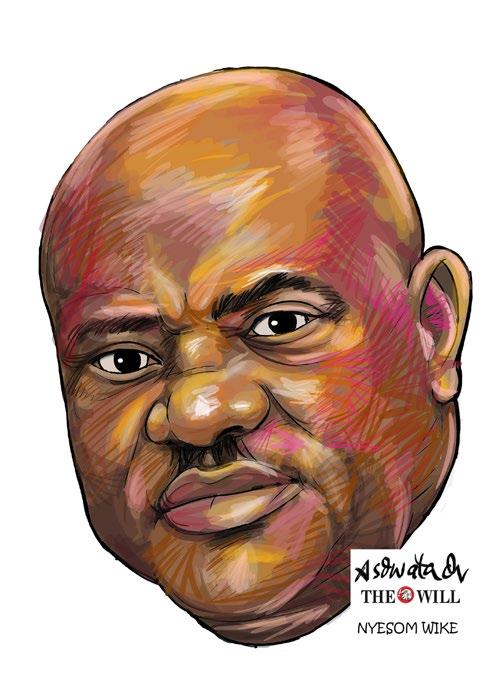
be governor; he wanted his cousin to be governor. He has now become the governor’s friend and we have now become the enemies. To God be the glory,” said Wike, adding, “I heard Secondus say the other day in Bori that I awarded the Bori Internal Road as governor. Secondus was saying that his enemies; who are the enemies of the governor? Secondus refused him to be governor.”
He denied abandoning projects for Fubara to finish and explained that he paid 50 per cent in the hope that “we have a governor that we all agreed to continue,” On exGovernor Omehia, Wike described the former Governor as an un derperformer.
Wike had in October 2022 signed an instrument that derecognised Omehia as former governor of the state and in March 2024, Rivers State High Court ruled that Omehia was not a former governor of the state and as such was not entitled to pensions. But Governor Fubara has since overturned that decision and restored the former governor status to Omehia.
Wike noted, “I overheard one imbecile and let him challenge me, an imbecile Celestine Omehia. I say so and that is why when he wanted to occupy the Government House, I kicked him out. We could not have an imbecile as governor. He said they should ask me what I have done for Rivers State. That is why I say he is an imbecile. If he understands that, I am not a minister of a ministry!


chose today to give gratitude to God. Like the preacher said, as it is in the Bible, those who give gratitude can ask for more from God. Those that don’t, will have their
He said though the PDP loyalists toiled to be in government, they had been pushed aside, saying that “time is ticking and very soon we shall reclaim our state.” This may have triggered the FCT Minister, who after thanking his host for the event, launched his tirade of attack against Secondus and Omehia.
Delving into the recent political past, Wike disclosed that the ex- PDP National Chairman, Secondus opposed the choice of Fubara as Rivers governor in 2023, preferring his cousin, Tele Ikuru as his preferred party’s candidate Wike said it was this intrigue
Governor Fubara confronted the challenge, prevented the quest by one man to capture the state as a private estate, emancipated Rivers people, steadied governance and made civil servants and Rivers people happier as it used to be until I left office in 2007
that he plotted the removal of Secondus as the PDP National Chairman.
“I kicked out Secondus as PDP National Chairman when he wanted to make his cousin, Tele Ikuru, to be governor. Today, he is saying now that we are enemies. Secondus was the one who refused the man (Fubara) to
“I am the Minister of the Federal Capital Territory. When I was Minister of Education, he would have challenged me and asked ‘What did you bring to Rivers State?’ I was Minister of Education, I brought the Faculty of Law to the University of Port Harcourt. I gave grants to Ken Saro-Wiwa Polytechnic; I gave grants to Ignatius Ajuru University. I made sure to renovate the Federal Government College Port Harcourt and the Federal Government Girls College, Abuloma. That was what I thought.” Wike stated.
He said though as the FCT Minister now, he cannot bring road projects or FCT money to Rivers State, “I can help Rivers people. And I have been helping Rivers people.” He also boasted that “by the instrumentality of Mr President, there is no governor in this state that has attracted political appointments to this state other than myself. Go and count it.”
“By the instrumentality of Mr President; by his grace, by his love for us, he said, ‘Go and give me these names for political appointments’. So, Mr Omehia, are you not aware that Rivers people have more political appointments than even when you are serving somebody.
Ex- Governor Peter Odili has waded into the new development by describing Fubara as courageous in stopping the usurpation of the state treasury by Wike.
Speaking at a Christmas party he organized for the governor, Osula said, “Governor Fubara summoned an unusual fortitude to confront the quest by Wike to capture Rivers State through ferocious, but unnecessary political war.
As a family, my wife, children and I, decided to host the Rivers State Governor and his family to a night of varieties of sing-song and other activities in appreciation of the fortitude and sterling leadership qualities he has demonstrated.
“It is now over 12 months, since the 25th of October, 2023, when a fierce existential fight, though unnecessary, was waged against Governor Fubara over the soul of Rivers State.
“Governor Fubara confronted the challenge, prevented the quest by one man to capture the state as a private estate, emancipated Rivers people, steadied governance and made civil servants and Rivers people happier as it used to be until I left office in 2007”, Odili said.
In his response, Fubara said that God has proved Himself worthy as the Ultimate Liberator of the State and its people because He ensured total triumph over the political crisis and those behind it.
BY AISHA GAMBO
Bilkisu Aminu was just 16 when she was married off by her parents. Coming from a less privileged background in Igabi Local Government Area, Kaduna, young Bilkisu had keen interest in learning. She wanted to become a medical doctor.
“When a well-to-do suitor came to my house seeking my hand in marriage, I told him I would continue my education after marriage because I was in JSS 1 when he proposed.
“But he refused, he said he didn’t want me to go to school after marriage and my dad didn’t give me the support I needed; so I kept begging even after marriage.
“I kept my uniform in a safe place because I love school and would want to return. Aminu is now 21 and divorced with a child. Her interest in learning is reignited. She wants to go back to school but does not know where to start.
According to a report by Save the Children78 percent of girls in the northern region of Nigeria are married before the age of 18, while 44 per cent of girls are married before their 18th birthday in the whole country. The report titled “State of the Nigerian Girl Report –An Incisive Diagnosis of Child Marriage” shows that child marriage is more prevalent in the northwest and northeast of Nigeria. The report also states that 48 per cent of girls were married by age 15 and 78 per cent were married by age 18. A survey by the Kaduna State Bureau of Statistics in 2020 shows that 31.1 per cent of children within the primary school age were out of school. It also showed that 31.9 per cent of children within the junior secondary school age were out of school in the state.
KADUNA STATE’S SECOND CHANCE POLICY
The Kaduna State School Census Report 2020 revealed that 25 percent of adolescent girls dropped out of school. This is due to factors like early marriage, insecurity and poverty, among others. With this development, the Kaduna state government developed an Education Policy in 2019 which made provision for Second Chance Education (SCE).
The state also developed a 10-year Education Sector Plan (ESP) named Kaduna State 2019 – 2029 Education Sector Strategic Plan. The plan is a comprehensive and strategic framework developed with the support of development partners to guide planning, implementation and evaluation of education policies and programmes. UNICEF says to achieve Sustainable Development Goal 4, which is inclusive and equitable quality education for all, a Gender-Responsive Education Sector Planning (GRESP) is essential.
The Director of Planning, Kaduna State Ministry of Education, Salisu Lawal, stated that SCE is being implemented with support from development partners for girls who dropped out because they got married. He said the programme had so far reached 14 communities in 10 Local Government Areas across the state with about 700 drop-out married adolescent girls benefitting since inception in 2018.
Aisha Muhammad, Deputy Director, Female Education stated that the department creates awareness in communities and engages traditional and religious leaders on the need for drop-out married girls to go to school. “Those leaders now announce in churches and mosques urging girls interested in going back to school to join the programme.

adjust the school time for married women, saying most married women find it hard to be in school in the morning. Aliyu, who married at the age of 15, could not complete her secondary education as she dropped out of school after JSS 3. After having her first child, Aliyu decided to go back to school but her husband would not allow her. She eventually got divorced and remarried. The new husband is supportive; he allowed her to go back to school.
Another beneficiary attending Government Secondary School (GSS), Rido in Chikun LGA, Nafisa Aminu, who is a nursing mother, urged the government to include virtual learning in the SCE programme “We go to school late due to house chores and children; my attention is usually divided since we are not allowed to bring babies to the class.
“If we can get a crèche where we can keep our children till lessons are over, it will help us a lot; we can learn online or on radio just like the way it happened during COVID-19,” she said.
EXPERTS ADVOCATE PROGRAMME FLEXIBILITY, AWARENESS
In spite of efforts by the state government to sustain the SCE policy, some experts are of the view that more needs to be done for effective implementation. Barr. Jennifer Abaji, Founder, Basileia Vulnerable Persons Rights Initiative (BVPRI), stated that one of the things stopping married adolescent girls from joining the second chance education programme is insufficient flexibility.
“We are advocating for the Kaduna state government to leverage ICT to make this second chance education programme more flexible.
“That means instead of the girl getting worried about always getting to school, the school can get to the married adolescents through remote learning. “Our organisation has successfully convinced the government to allow out-of-school married adolescents to be able to learn from home leveraging ICT.
“We are glad that the government has bought into it and they are excited to review the second chance programme and they promised to invite us to review of the entire policy,” he said.
According to Abaji, the second chance programme has not been fully utilised saying it would have reached more people if it was flexible.
She recommended that skills acquisition should be added to the programme so that married girls can be able to solve some small financial issues and take care of themselves properly.
Abaji called on the government to ensure that these out-of-school married adolescents are able to have access to the technological tools needed to learn remotely. As some experts advocate the flexibility of the programme by leveraging ICT, others are calling for intensified awareness campaigns on the programme.
Mrs Margaret John, the principal of Babban Sauran Junior Secondary School stated that most of the girls who are interested in going back to school are not well informed about the programme. “The government needs to step up advertising in jingles both on television and radio. “It should also use government schools to invite communities around and inform them on the need to bring out these interested girls.
“Most of the problem now is that they are not even aware of the opportunities and if they do, the response would be very interesting,” she said. Stakeholders however agree that the SCE policy of Kaduna State represents a transformative initiative to address the educational challenges faced by adolescent girls, particularly those impacted by early marriage and other socio-economic barriers.
While significant progress has been made in providing opportunities for school dropouts to return to learning, much remains to be done to enhance its impact.

“We also engage husbands and show them the importance of education to their wives and family at large. “Some will agree while others will not and some of the adolescent girls who dropped out to get married may later get divorced.
“Others may lose their husbands and come back to school while some who dropped out of school due to medical challenges would want to go back to school.
She said that the ministry is planning to scale up the programme to other local government areas.
BENEFICIARIES’ PLEA
Rabi’at Aliyu, an enrollee in SCE, called on the government to
Aisha Muhammad, Deputy Director, Female Education stated that the department creates awareness in communities and engages traditional and religious leaders on the need for drop-out married girls to go to school “
Aged 21, Aliyu enrolled in Government Secondary School, Rigasa and is now in SS 2.
“My challenge started when I got pregnant; I had to go on a break because it wasn’t easy and the school authorities understood. “Whenever there is a need for me to go back home during school hours, the school authorities allow me because they are aware I’m married. “I want to become a journalist, that is why I’m not giving up,” she said.

Flexibility in the programme, including virtual learning options and provision of childcare facilities, as well as the integration of skills acquisition, can help address the unique needs of married girls and young mothers. Moreover, intensified awareness campaigns are crucial to ensuring that more girls and their families are informed about the programme’s existence and benefits.
As the Kaduna State government works to scale up the initiative, collaboration with stakeholders and leveraging technology will be key to ensuring that no girl is left behind in the pursuit of education. By empowering these young women, the state not only transforms their lives but also strengthens the foundation for a more inclusive and prosperous society. (NANFeatures)














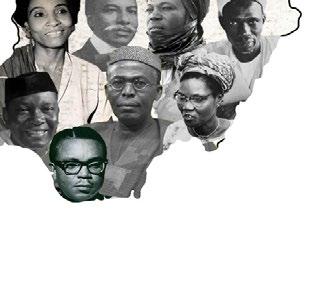





10X5 N650, 000 10X4 N600, 000
10X3 N500, 000
9X6 N440, 000
9X5 N395, 000
9X4 N335, 000
9X3 N310, 000

8X6 N410, 000
8X5 N380, 000




7X5 N320, 000
7X4 N315, 000

6X5 N280, 000

6X3 N145, 000
6X2 N85, 000
5X2 N70, 000
4X4 N160, 000
4X3 N95, 000
4X2 N65, 000
3X3 N60, 000
3X2 N50, 000
2X2 N30, 000
2X1 N15, 000 1X1 N7, 000
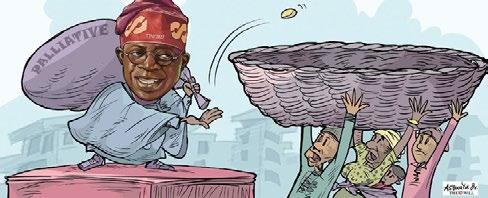












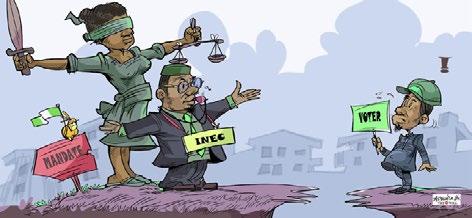










A D V E R T I S E M E N T R A T E EFFECTIVE APRIL 1, 2024
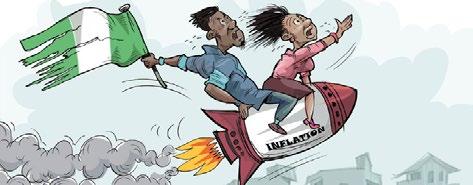


Front Page 5X6 – N5, 000, 000
Front Page Strip– 4x6 – N1, 400, 000
Front Page Strip 3x6 – N800, 000 Change of Name (Classified) N5, 000 Page/Column Branding – Negotiable




























BY ERASMUS IKHIDE
The axiom in my part of the world states, “A madman is an excitable spectacle to watch but certainly not when he’s your relation”. All along — Adams Oshiomhole has been polluting the Nigerian political space with incoherent, illogical and rule-of-the-thumb twitches that drew barrel—blank and blink mockery to the Edo Nation and its citizens alike.
As a celebrated revisionist and recidivist and a loquacious vanity of a senator, it is time public consciousness is awoken in order to prevent Oshiomhole from depreciating and dismantling the Constitution of the Federal Republic of Nigeria.
THE NIGERIAN POLICY COURT (THE SUPREME COURT) WAS UNEQUIVOCAL IN ITS JUDGEMENT ON LOCAL GOVERNMENT AUTONOMY. THE VERDICT ENABLED LOCAL GOVERNMENTS TO MAKE DECISIONS AND TO TAKE ACTIONS WITHOUT NEEDING APPROVAL FROM STATE GOVERNMENTS
On July 11, 2024, the Supreme Court delivered a landmark judgement affirming the financial autonomy of Nigeria’s 774 Local Government Councils. As a follow-up to the judgement, the Secretary to the Government of the Federation (SGF), Senator George Akume, inaugurated an Inter-Ministerial Implementation Committee to enforce the Supreme Court judgement delivered on July 11, 2024, granting financial autonomy to local governments in Nigeria.
In other words, the full financial autonomy granted to the local government councils meant that their share of the monthly statutory allocations from the Federation Accounts Allocation Committee (FAAC) was sent to them directly and the internally generated revenue was all spent without reference or interference from any quarters.
Earlier this year, on the floor of the National Assembly’s Red Chambers in the Senate,

IAdams Oshiomhole gloated grandstandingly about the illegality of dissolving elected local government officials across the country. In line with the recent Supreme Court ruling, Oshiomhole further cited an example of ‘how he rejected the urge to dissolve elected council officials from political leaders of his political party as the then governor of Edo State until their term ran its full cycle.
That was Oshiomhole last year, gaslighting Prof. Charles Soludo of Anambra State over local councils dissolution in his state. Like a turncoat, Oshiomhole turned full cycle— singing discordant tunes—supporting the dissolution of 18 elected council members by the ineffectual, hermit and uncharitable Governor Monday Okpebholo of Edo State.
The Nigerian policy court (the Supreme Court) was unequivocal in its judgement on local government autonomy. The verdict enabled local governments to make decisions and to take actions without needing approval from state governments, adding that local governments can now manage their finances, collect revenues, and allocate resources without interference from state governments.
The judgement has laid to rest the argument of whether or not governors can dissolve elected council officials since they lack the power to regulate the local councils’ activities. What a vacillating Oshiomhole wanted was a Nigerian and Edo State cast in his own primitive image and likeness where pernicious proclivity operates the levers of power and wealth.
A few weeks ago, many unsuspecting Nigerians idolised Oshiomhole for stepping up to the plague of national darkness visited on the country by those entrusted with electricity generation and supply. Most Nigerians are unaware that a grandiose and asphyxiating Oshiomhole needed that showmanship in the Senate’s Red Chambers to have Mr Tony Elumelu and his co-accomplice in the power generation fiasco worship and engage him in a nationalistic patronage system, a euphemism for corruption.
Oshiomhole’s gloating gang must be reined in in the interest of national constitutional harmony because when self-interests conspire to gain ascendancy, all other interests, including national interest, must take a back seat. There *is no better time to consign the likes of haunting and vaulting Adams Oshiomhole to the dustbin of our national political history—regardless of the vicarious satisfaction for his immediate family—if a new Nigeria must emerge.
BY SUNDAY ONYEMAECHI EZE
t was a bitter and sad moment for Nigeria, particularly for the families of those who lost their loved ones in the three separate stampedes which occurred in Abuja, Okija and Ibadan, in the Federal Capital Territory, Anambra and Oyo States, respectively. The incident in Ibadan involved innocent little kids, who attended a Christmas Carnival organised by Prophetess Naomi Silekunola, an ex-wife of the Ooni of Ife.
The other two cases happened at a giveaway food charity event organised by a Catholic church and spirited individuals to cushion the effects of hardship. The stampedes resulted in the death of over 81 persons with many others injured and hospitalised, according to reports. The victims met their untimely death simply because they were hungry and had no means of putting food on their tables. The joyous season of Christmas was short-lived with agonising pain, regrets and mournful tears.
For those who lost their loved ones, it was a dark Christmas and the season will remain an unforgettable traumatic experience for a long time to come. Like many other well-meaning Nigerians, I implore you to take heart. The fact that many people turned out in large numbers to scramble for 10kg of rice, which ended in tragic circumstances in a nation endowed with so many human and material resources was so sad. This is an indictment on the current governments at the federal and the state levels.
There is a strong nexus between hunger, stampedes and death in the country during this period. And the following underlying factors are quick pointers. One is harsh economic conditions occasioned by government policies. The willful proclamation of – “subsidy is gone” by President Tinubu the same day he was inaugurated and the floating of Naira had forced the economic fundamentals and market forces to agitate and swiftly turn against Nigerians. Lest we forget, the pump price of petrol rose from N187 to N1,700 while the exchange rate jumped from N400 to $1 to as much as N2,000. As an oil-dependent economy, the effect of that singular presidential declaration severely compounded the woes of every other sector of the economy. The current galloping inflation; the rising cost of food, transport fare and other essential commodities never witnessed before in decades has emerged as a result. These government decisions have far-reaching implications which have set the nation ten years backwards.
Two, poor event planning and effective crowd management. Modalities for effective crowd management should have been put in place by the organisers from the onset. Experts in crowd management should have been dispatched to the event venues for adequate control. It would have assisted in no small measure in preventing or reducing the tally of deaths recorded. Even though the organisers least expected the surge in crowd, it should have been envisaged in the prism of proper planning. The organisers should have taken a cue from past experience, bearing in mind that people more often than not run out of control in situations like this.
Three, the love for freebies by Nigerians. The penchant for always wanting to benefit from free handouts from charity or spirited individuals every Christmas season even by those who should be content with the little they have has become our way of life. Though the government seems to live in a bubble of its own and has no clear understanding of the enormity of damage it has done to the entire system, many Nigerians love ‘awoof’ and as they say “awoof dey run belle”. One would be surprised that some people who have bought little things for their families were also at the venues
to get additions. Sometimes, people set unusual targets and raise expectations for themselves during Christmas and when they are not met, every means available to meet up becomes their destination.
ANY GROUP OR INDIVIDUAL PLANNING AN EVENT OF THIS NATURE IN THE NEAREST FUTURE SHOULD TAKE AN INVENTORY OR AN AUDIT OF THE NUMBER OF PEOPLE WHO WILL BENEFIT FROM THEIR GESTURE AND STRICTLY SEND INVITES ON THAT BASIS. DISTRIBUTION CENTRES CAN BE DECENTRALISED FOR EASY MANAGEMENT OF PEOPLE AND OTHER MISCELLANEOUS CIRCUMSTANCES. EXPERTS SHOULD BE ENGAGED TO MANAGE AND CONTROL CROWDS
Fourth, ignoring safety standards. This is one important factor the organisers left unattended to. How big are the venues of the events? Did organisers take into consideration the number of people the venues can accommodate? Did attendees exceed the envisaged numbers and if they did, what was the plan for the extra? How about medical personnel to help in time of need? Five, parental irresponsibility. Ordinarily, every rightthinking parent should envisage rancour in venues under review. Therefore, no children should have been allowed into areas like the events of Abuja and Anambra.
The Ibadan tragedy begs for an answer as to why parents should throw their children into the event venue through the fence.
Those trying frantically to exonerate the government from any wrongdoing should put themselves in the shoes of the affected. It is the policies of the government that uplift citizens or send them deep into the abyss of poverty. President Tinubu and the state governors should be reminded that; it was a failure on their part to provide good governance that led to these crises. They should be reminded that people are suffering more than they thought and grasping for fresh air of survival. Those who have food do not go about begging.
For a nation capable of re-inventing itself and re-energising its innate potential to catalyse rapid development but failed to, the events of the past days were sad reminders of how badly the economy has deteriorated. The need to give to society was the priority of the organisers of those events. This was in line with the mood of the season and the scriptures in Matthew 25: 40; “Verily I say unto you, in as much as ye have done it unto one of the least of these my brethren; ye have done it unto

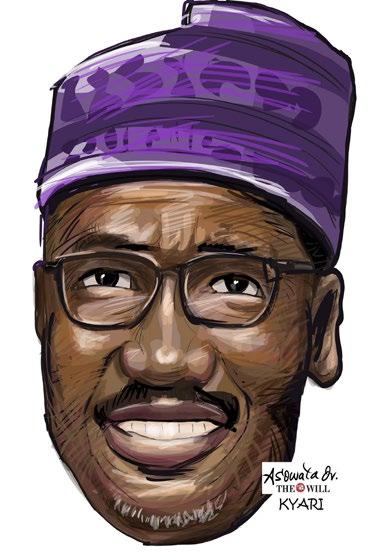
About five months after the Nigerian National Petroleum Company Limited (NNPC Ltd.) said it had commenced the search for companies to take over the running of the Kaduna and Warri Refineries, the national oil company has unveiled plans to ‘modernise’ the facilities.
The NNPC last week announced that the 150,000 barrels per day (bpd) Port Harcourt Refinery and the Kaduna Refinery are undergoing a comprehensive overhaul aimed at meeting world-class standards. This was disclosed in a statement no by the Chief Corporate Communications Officer of NNPC Ltd., Olufemi Soneye, in response to comments from former President Olusegun Obasanjo regarding the refineries’ rehabilitation on Thursday. According to NNPC, the rehabilitation of the 60,000 bpd Port Harcourt and Warri refineries exceeds traditional Turnaround Maintenance (TAM), representing a full revamp to meet global standards. He reaffirmed NNPC Ltd.’s commitment to restoring and maintaining the refineries to global standards for sustainable operations.
THEWILL recalls that NNPC had in August 2024, announced plans to concession the facilities.having committed enormous sums of taxpayers’ money in fixing the plants, the announcement was a huge surprise to Nigerians
In a circular on its website, the national oil company said, “The Nigerian National Petroleum Company Limited (NNPC Ltd)
Continues on page 15
EDITOR
Sam Diala
BY SAM DIALA
Nigeria’s equities market delivered a record N21.85 trillion gain in 2024 on the back of robust investors’ confidence that characterised trading activities during the period.
Data from the Nigerian Exchange Limited (NGX) showed that the the local bourse which closed the 2023 trading with equities capitalisation at N40.91 trillion and NGX All-Share Index (ASI) at 74,773.77 points, rose to N62.76 trillion and 102,926.60 points respectively as of December 31, 2025.
This exceptionally impressive performance pushed stock value higher by N21.85 trillion and the ASI up by 28,152.63 translating to a growth of 53.40 percent and 37.65 percent respectively in 2024.
The local bourse had launched into the 2024 trading year on a robust enthusiasm. Aside from coinciding with the second anniversary of the demutualisation of the NGX Group in March 2021, the positive sentiment during the period was underscored by the change of leadership at the Group.
Temi Popoola was announced the Acting Group Managing Director/ Chief Executive Officer (GMD/CEO) effective January 2024. He replaced Oscar Onyema. In the same vein, Jude Chiemeka took over from Popoola as Acting CEO of NGX Limited.
Like a team powered by the elevated furnace of good fortune, the NGX began to move on the bullish territory in a consistent, spectacular way.
The local bourse furthered its rally into 2024, rising by 1.63 percent on January 2, the first trading day of the new year. The trend remained unwavering to the end of January as the NGX ASI appreciated by 3 percent to cross 100,000 index points hitting a record 101,571.11.
This impressive twist of events which hinged largely on increased investors’ confidence anchored to the reform policies of the Nigerian government manifested in the outstanding 2024 performance.
“Change in government policies, removal of fuel subsidy fuelled the rally in the oil and gas, while the devaluation of the naira made the banks to make huge profits from FX gains.
“So, the market responded. There is also a huge inflow from politically exposed person’s who now have the confidence to invest due to change in government”, said Dr Paul Uzum, a top stockbroker.
The Monetary Policy Committee of the CBN raised the interest rate by 25 basis points to 27.50 per cent in November from 27.25 per cent in September 2024
The CBN Governor, Yemi Cardoso, noted that the decision to raise the country’s Monetary Policy Rate was to tackle inflation, which stood at 33.87 per cent in October 2024. This has further jumped to 34.6 percent in November, 2024.
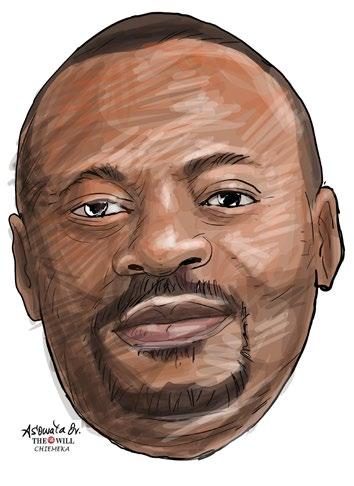
However, the high foreign portfolio inflow sparked by the bank recapitalisation exercise boosted both the foreign reserves and the NGX capitalisation
It is on record that the NGX had earlier secured its position as the world’s best performing stock market in the first three weeks of 2024, at a record 94,538.12 index points.
.A closer look at the year’s performance showed that the equities market experienced alternating months of growth and decline with the steepest drops occurring in April (-6.06 percent) and July (-2.28 percent).
Despite the setbacks, the market showed recoveries in March, May, June and September.
IT IS ON RECORD THAT THE NGX HAD EARLIER SECURED ITS POSITION AS THE WORLD’S BEST PERFORMING STOCK MARKET IN THE FIRST THREE WEEKS OF 2024, AT A RECORD 94,538.12 INDEX POINTS
The tight monetary policy regime of the Central Bank of Nigeria (CBN) created convenient environment for investors who thronged to the fixed deposit market
In 2024, the CBN raised its interest rate six times between February and November, totaling 875 basis points aimed at reining in inflation.
In an impressive twist of events, the market closed positively in November, with N59.10 trillion, posting a 44.45 percent gain which pointed to a sustained bullish yearend as predicted by investment analysts.
Looking at the quarterly performance, the market saw a robust 39.84 percent growth in Q1 2024, rising from 74,773.77 to 101,562.06. However, the second and third quarters witnessed modest corrections, with the declines of -4.31 percent in Q2 and 1.50 percent in Q3.
“Despite the smaller decline in Q3,, investors were cautiously optimistic as they expected a modest bullish turnaround in Q4 encouraged by improving sentiment and probable policy adjustments,” said David Akinwale, a financial and investment analyst.

The Nigerian Civil Aviation Authority has reassured Nigerians of the enhanced safety of the nation’s airspace, citing improved surveillance measures and compliance enforcement as key drivers.
Acting Director-General of Civil Aviation, Capt. Chris Najomo, made this known during the Authority’s annual New Year prayer session held at its corporate headquarters in Abuja on Tuesday.
The event also marked the commencement of activities to celebrate NCAA’s 25th anniversary.
Speaking at the sidelines of the event, Capt. Najomo affirmed that the Authority has significantly bolstered its safety surveillance capabilities, making the airspace safer for airlines and passengers alike.
“With the Renewed Hope agenda championed by Mr. President and the aviation minister’s five-point agenda, we have the backing to perform even better. Our directors and management team are fully on ground to ensure compliance and enforce standards,” Najomo said.
He added, “Recently, we sanctioned five airlines for failing to process passenger ticket refunds on time. They have since accepted their penalties and pledged to comply moving forward. This year, 2025, we expect even
better compliance and improved services across the sector.”
Addressing reports of fabricated stories aimed at tarnishing his image, Najomo maintained that such distractions have not deterred him from achieving his goals.
“The attacks do not affect my work. I remain resolute and focused on delivering on my responsibilities. My confirmation as DirectorGeneral is in the hands of Mr. President, and I trust he will do the needful at the right time. For now, I’m focused on ensuring NCAA continues to meet its objectives,” he stated.
On staff welfare and working conditions, Najomo emphasised ongoing efforts to motivate employees and improve their workspace.
“We are moving towards full digitalization. We’ve deployed systems like the Flight Data Center, CPD portal, and DATR portal to streamline processes and make operations seamless. These solutions enhance efficiency and ease of doing business within the aviation sector,” he noted.
Continues from page 15
is seeking to engage reputable and credible Operations & Maintenance (O&M) companies to operate and maintain two of its refineries, Warri Refining and Petrochemical Company (WRPC) and Kaduna Refining and Petrochemical Company (KRPC), to ensure reliability and sustainability to meet the nation’s fuel supply and energy security obligations.”
Speaking on an Arise Television News programme recently, an oil and gas expert, Mr Godwin Ibe, noted that though the arrangement was still unclear as to what the role of NNPCL would be when it transfers the operation and maintenance of the refineries to another party, the continued operation of the refineries by NNPC should stop.
the facilities ought to have been sold off.
“The ideal situation would be to sell off the refineries to private investors. If NNPC still wants to be involved, they should have equity because it has been proved that NNPCL cannot operate the refineries. They should not be the operator.
“If Dangote had acquired those refineries, we would have gone far in resolving the lingering energy challenges that now confront the nation in terms of producing what we require as a country. These refineries should be sold out,” he emphasised.
“The ideal situation would be to sell off the refineries to private investors. If NNPC still wants to be involved, they should have equity because it has been proved that NNPCL cannot operate the refineries. They should not be the operator.”

The highlight of the event was the hoisting of the NCAA @25 flag and the unveiling of an anniversary monument by Capt. Najomo, accompanied by his management team and enthusiastic staff.
The chairman of the Federal Inland Revenue Service (FIRS), Zacch Adedeji, has stated that the federal government is on track to achieve its N19.4 trillion revenue target for 2024.
Adedeji made this statement on Monday, attributing the progress to President Tinubu’s initiatives aimed at addressing tax collection deficiencies.
Adedeji noted that increased crude oil production this year, along with a stronger focus on tax compliance, is helping to reverse the previous downward trend.
According to the FIRS chairman, the agency plans to boost tax efficiency by overhauling outdated tax laws, such as the Stamp Duty Act, which was established in 1939, before the existence of internet connectivity or any modern societal features.

“We set a target of 19.4 trillion naira for ourselves this year.
“We are almost in the third quarter of the year and with the figures we are seeing so far, I can say we are on the path of achieving our target,” he said.
The committee which is headed by Taiwo Oyedele, a renowned tax expert, has rolled out some fiscal measures which include tax exemptions for manufacturers, farmers and those who earned below a certain monetary benchmark.
The committee has submitted its all-inclusive reports to the president, which cover efficiency in tax collection, reduction of the number of taxes from about 60 to single digit and also the digitization of tax collection across multiple industries.
In the first quarter of 2024, the FIRS announced that the country recorded
Answering a question on the feasibility of achieving the objective of the exercise as explained by NNPCL, Mr Ibe lamented the many years that the plants had laid dormant, and observed that a large portion of the plant would have become obsolete as the manufacturers of those plants would no longer be in existence, adding that
Coming after many assurances by the NNPCL management to fix and deliver the refineries, including the ones located in Warri and Kaduna, and having committed enormous sums of taxpayers’ money in fixing the plants, the recent announcement was a huge surprise to Nigerians.
N3.94 trillion in tax revenue a 56.7% increase from what was recorded in the same period the previous year.
Nigeria is grappling with one of its most severe cost of living crises in decades, with inflation reaching 33.4%, according to the National Bureau of Statistics (NBS).
Despite being densely populated, with a large youth demographic, the country continues to face revenue shortfalls due to low economic output and widespread unemployment.
Nigeria’s revenue-to-GDP ratio is among the lowest in Africa, contributing just 10.8% to the GDP.
The 2024 budget was set at N27.5 trillion, with a revenue target deficit of around N62 trillion, and a projected deficit of around N6 trillion.
This budget prioritizes capital

expenditure, aiming to address critical infrastructure challenges while also seeking to reduce the country’s debt-to-service ratio.

BY INWALOMHE DONALD
In 2013, former Governor Rauf Aregbesola of Osun State introduced Sukuk to Nigeria as a tool for national economic development. It has since been embraced by Nigerians. Aregbesola deserves national recognition for pioneering this innovative financing instrument in the country. The issuance of Sukuk attracts domestic investment capital, which is deployed in compliance with Islamic principles. It ensures that every financial activity is backed by real economic activity, thereby promoting financial stability and sustainable economic development.
The Securities and Exchange Commission (SEC) recently disclosed that the Federal Government has issued six Sovereign Sukuk worth N1.1 trillion ($657.6M) to finance 124 federal road projects spanning over 5,820 kilometres across Nigeria’s six geopolitical zones. SEC’s Director General, Dr. Emomotimi Agama, made this announcement during the 2nd International Islamic Capital Market Conference in Karachi, Pakistan.
A statement from the SEC highlighted that the success of Sukuk underscores its resilience and innovation as a tool for mobilising resources. Dr. Agama described the issuance of sovereign Sukuk since 2017 as a cornerstone for the growth of the Islamic Capital Market (ICM) in Nigeria, with oversubscription rates as high as 441 percent.
Sukuk issuance has extended beyond federal projects to subnational and corporate levels in Nigeria. Examples include Sukuk bonds issued by Osun and Lagos States, Family Homes Ltd, and TAJ Bank Plc, as well as private Sukuk issuances by other entities. These bonds have funded school infrastructure, housing projects, and even tier-1 capital for banks, showcasing Sukuk’s versatility as a financing tool.
Critics of Sukuk, including the Christian Association of Nigeria, initially expressed concerns that its introduction in Osun State was part of an alleged agenda to Islamise the state. However, the success of Sukuk projects across the country has dispelled these fears. Osun State utilised Sukuk funds to build two structural steel and nine high schools, which included 216 classrooms, three ICT halls, 18 laboratories, and additional facilities capable of enduring harsh conditions.
It is now evident that Sukuk is an alternative means of raising funds for infrastructure projects. Former Governor Aregbesola has been vindicated, as subsequent
administrations, including those of former President Muhammadu Buhari and President Bola Ahmed Tinubu, have embraced Sukuk.
The dynamism of the Sukuk market contributes to financial stability and facilitates inter-regional investment flows. As Islamic finance continues to internationalise, it plays a significant role in global financial integration, fostering growth and stability.
The Federal Government’s use of proceeds from the first N100 billion Sukuk bond to fund 25 key economic road projects exemplifies this potential. The then Minister of Finance, Mrs. Kemi Adeosun, handed over the funds to the then Minister of Power, Works, and Housing, Babatunde Fashola. The bond, issued in September 2018, was oversubscribed at N105.87 billion, reflecting confidence in Nigeria’s economy and leadership.
Mrs. Adeosun highlighted that the Sukuk proceeds were allocated to critical infrastructure projects, including the construction and rehabilitation of 25 federal

The dynamism of the Sukuk market contributes to financial stability and facilitates interregional investment flows
roads across all six geopolitical zones. Each zone received N16.67 billion, with projects like the Lokoja-Benin Road, Abuja-AbajiLokoja Road, and the Oju-Loko-Oweto Bridge benefiting from these funds.
Concerns that Islamic financial institutions would own completed infrastructure projects have been debunked. The Federal Government’s Sukuk issuance is aimed at fostering financial inclusion and addressing Nigeria’s infrastructure deficit. Critics are encouraged to visit Sukuk-funded projects to witness their transformative impact.
For example, the Northeast region benefited from projects such as the dualisation of the Kano-Maiduguri Road and the construction of the Kaduna Eastern Bypass. Similarly, in the Southeast, the rehabilitation of the Enugu-Port Harcourt Dual Carriageway and Onitsha-Enugu Motorway were funded




Photo Editor: Peace Udugba [08033050729]
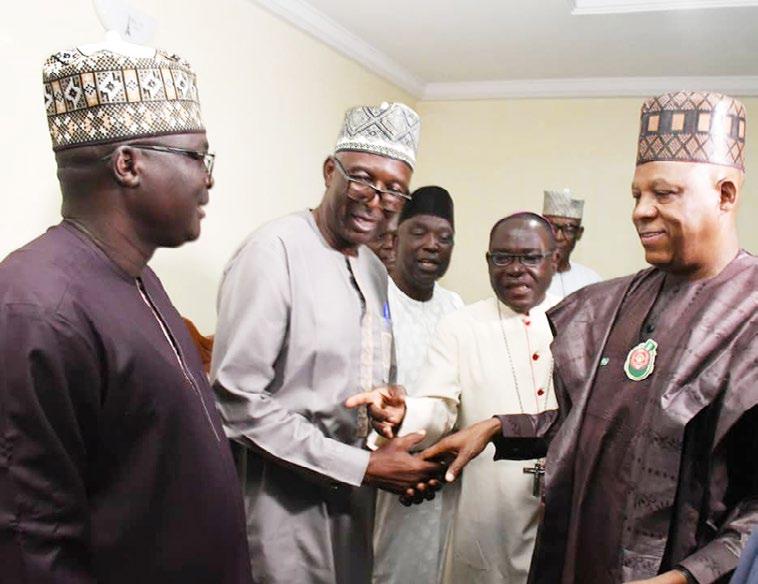
of Ikulu, Alhaji Ismail Yusuf Ashafe; National President, Ikulu Development Association, Bature Likoro; Catholic Bishop of Sokoto Diocese, Most Rev Hassan Kukah and Vice President Kashim Shettima, during the Vice President’s Condolence Visit to the Kukah family over the death of Agwom Akulu, His Highness, Yohanna Sidi Kukah, at Ikulu in

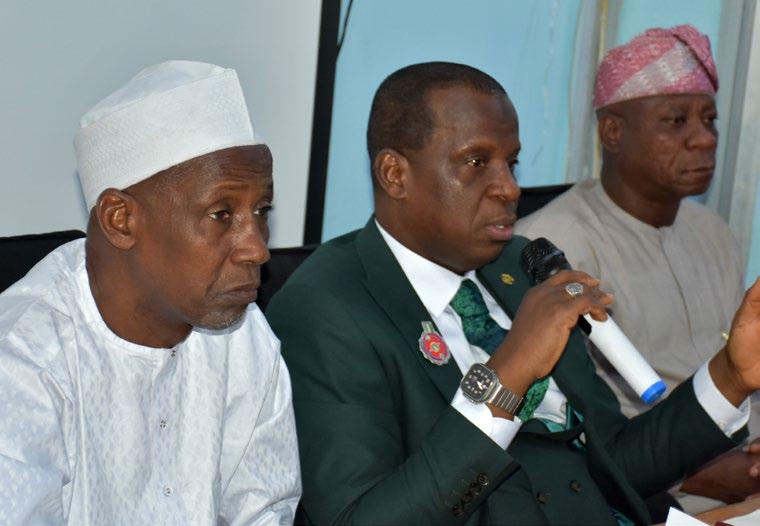
Director, Administration and Human
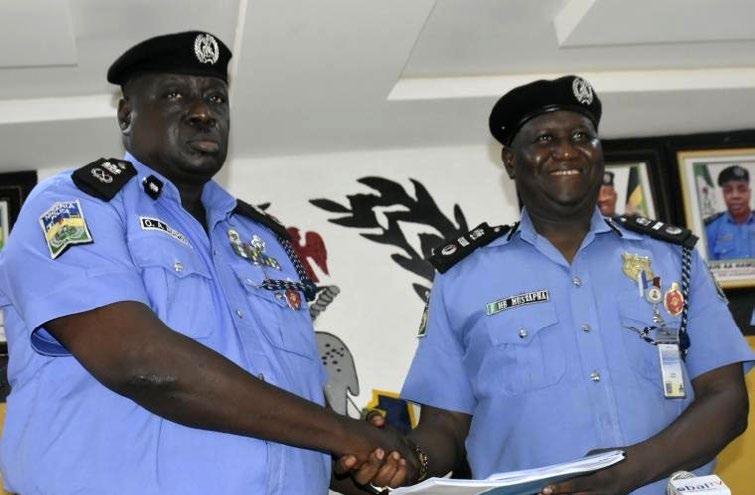

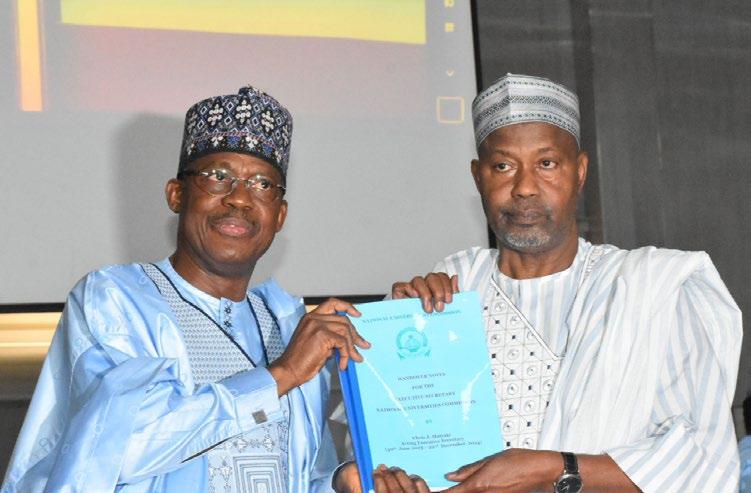
L-R: Acting Executive Secretary, National Universities Commission (NUC), Dr Chris Maiyaki, handing over to the new Executive Secretary, Prof. Ribadu in Abuja on December




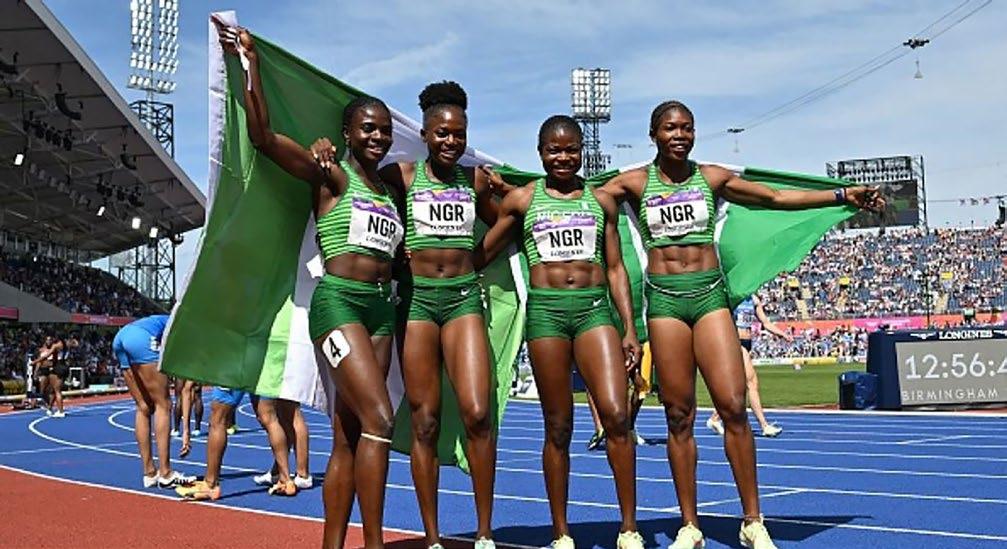
BY JUDE OBAFEMI
In the wake of a year where the Nigerian sports scene was riddled with more controversies than triumphs, the dawn of 2025 brings with it a glimmer of hope. The government has committed an unprecedented N78 billion to sports development in next year’s budget, a move that coincides with the transformation of the Ministry of Sports into the National Sports Commission (NSC). This significant financial injection poses the crucial question: with such resources, what can Nigerians genuinely anticipate from their sports sector in the coming year?
The year 2024 was a testament to the systemic challenges plaguing Nigerian sports. The Super Eagles’ lackluster performance in world cup qualifiers was a mirror to the broader issues of inadequate preparation, financial mismanagement, and internal discord within sports governance. The Nigerian Football Federation’s woes, including inability to conclude on a substantive coach for the senior men’s national football team, the Super Eagles after such a lengthy interim period where Austin Eguaveon has stood in the gap, highlighted a dire need for reform. Moreover, the oversight in grassroots sports development left many potential athletes without the necessary support, diminishing Nigeria’s competitive edge on the global stage. The unfortunate underwhelming performance of medal hopeful Tobi Amusan in Paris where she was expected to be among the athletes with a podium finish was a case in point. There was also the case of Favour Ofili whose participation in the Olympics was embarrassing, to say the least, was another instance where governance issues led to international embarrassment, mirroring Nigeria’s own sporting administrative failures.
Yet, amidst these challenges, 2024 wasn’t devoid of successes. The emergence of new athletic stars in events like the Commonwealth
Games and the African Championships signaled that raw talent still thrives in Nigeria. The renovation of the Moshood Abiola National Stadium in Abuja, although delayed, was a step towards improving sports infrastructure. The Nigeria Under-20 women’s football team, the Falconets, also provided moments of national pride, demonstrating that with the right support, Nigerian athletes can compete at the highest levels.
This N78 billion budget, as reported by various news outlets, aims to address some of these long-standing issues. It is expected to be channeled into grassroots development, infrastructure enhancement, athlete welfare, and international participation. Compared to previous years, this represents a significant uptick in financial commitment, suggesting a government intent on revitalising the sports sector. However, scepticism remains due to historical inefficiencies where substantial budgets have not always translated into proportional advancements. The allocation for grassroots sports, for instance, could be transformative if executed with transparency, but there is a history of funds not reaching these foundational levels.
The transition from a ministry to a commission reflects an attempt to streamline sports administration. The previous National Sports Commission, disbanded in 2015, was criticised for inefficiency and political interference. The hope now is that this new entity will foster better governance, reduce bureaucratic delays, and enhance public-private partnerships. The commission’s ability to manage this budget will be under scrutiny, particularly in light of past failures where even with resources, sports infrastructure like stadiums in Ibadan and Port Harcourt remained in disrepair.

The year 2024 was a testament to the systemic challenges
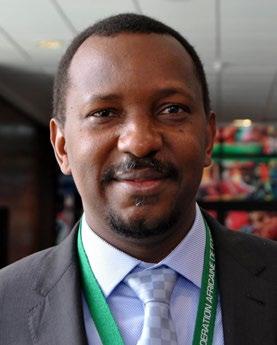
Infrastructure development is pivotal. Nigeria’s sports facilities are often in states of decay, impacting both domestic sports and international hosting capabilities. With this budget, there is an expectation to see not just renovations but the creation of new facilities, particularly in underserved areas. Projects like the potential upgrade of the National Stadium in Surulere, Lagos, are on the radar, but the real challenge will be ensuring these are not just promises.
Grassroots sports have been the Achilles’ heel of Nigerian sports development. The neglect here has meant that while Nigeria produces talent, it often lacks the structured pathways to nurture and professionalise this talent. The NSC must invest in scouting programs, youth leagues, and community sports facilities to
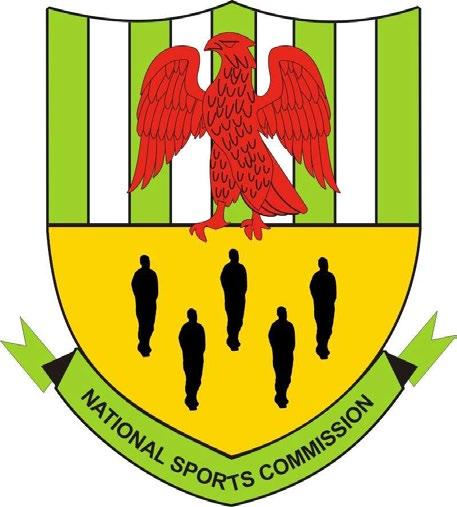
unearth and develop athletes early, similar to successful models in countries like Jamaica or Kenya.
Athlete welfare, including stipends, healthcare, and training, has also been substandard, leading to athletes seeking opportunities abroad. The new budget could facilitate better conditions, perhaps through partnerships with private health providers or international sports academies for training. This would not only improve athlete performance but also morale and loyalty to national teams.
Administrative reforms are perhaps the most crucial. The new commission must tackle corruption head-on, ensuring funds are used as intended. Transparency in how projects are awarded, athletes chosen, and finances reported will be vital to restore trust.
However, several challenges loom. Political interference in sports has been a persistent issue, often overshadowing merit with favoritism. Economic volatility might affect the actual value of the budget in real terms. Additionally, there is always the risk of delayed execution or projects left incomplete, a common scenario in Nigeria’s infrastructure projects.
Looking abroad, countries like South Africa have managed to leverage sports budgets to improve not just sports outcomes but also the economy through sports tourism. Nigeria can learn from these examples by ensuring sports development is seen as an investment in human capital and national pride.
Indeed, the N78 billion and the establishment of the NSC represent a goldenopportunityforNigeriansports.However,thispotentialwillonly be realised if there is an unwavering commitment to accountability, transparency, and genuine reform. If these conditions are met, there is a real chance for Nigeria to rebuild its sporting legacy, fostering a new generation of athletes who can stand proud on the world stage. The eyes of the nation, and indeed the world, will be watching to see if this time, the promise of sports revitalisation becomes reality.



ogannah@thewillnews.com
OnChristmas Day, a Nigerian military airstrike intended to neutralise the Lakurawa insurgent group in Silame Local Government Area of Sokoto State tragically resulted in the deaths of at least 10 civilians. The Defence Headquarters reported that these fatalities were due to “secondary explosions” following the strike.
In the wake of this incident, Vice President Kashim Shettima extended heartfelt condolences and issued a public apology to the bereaved families and the people of Sokoto State. He expressed deep regret for the unintended civilian casualties and the suffering endured by the affected families.
This tragic event underscores the complexities and challenges inherent in Nigeria’s ongoing battle against insurgency. However, it also highlights a significant event: For the first time in many years, the festive period concluded with only one major incident, the Christmas Eve killing of at least 140 people in rural communities in Bokkos and Barkin-Ladi areas of Plateau State believed to have been coordinated and executed by Fulani herdsmen in their unending conflict with farmers and landowners.
In previous years, Nigeria’s festive seasons have been marred by terrorist attacks, leading to significant loss of lives and widespread fear. One of the most notable incidents was the 2011 Christmas Day bombing at St. Theresa’s Catholic Church in Madalla, Niger State, where over 40 people lost their lives in an attack orchestrated by Boko Haram.
Similarly, in 2014, Boko Haram carried out a Christmas Eve massacre in Gombe State, killing at least 27 people as they attacked villages.
In 2016, a Christmas Eve attack in Southern Kaduna by suspected herdsmen left dozens dead, adding to the grim tally of lives lost during what should have been a season of peace and celebration. These incidents highlight the gravity of the threats Nigeria has faced during festive periods in the past.
The absence of such attacks during the recent holiday season is a significant milestone, reflecting the dedication and effectiveness of Nigeria’s security agencies. The relative peace experienced can be attributed to the relentless efforts of Nigeria’s security forces, including the Nigerian Army, Department of State Services (DSS), Nigeria Security and Civil Defence Corps (NSCDC) and the Nigeria Police Force (NPF). Their enhanced intelligence operations, increased presence in vulnerable areas and proactive measures have played a crucial role in deterring potential threats.
The Office of the National Security Adviser (NSA) and the leadership of these agencies deserve commendation for their strategic planning and execution. Their commitment has not only ensured safer celebrations but also restored a sense of security among citizens.
To sustain and build upon these achievements, it is imperative that government provides adequate support to security personnel by ensuring timely payment of salaries, offering financial rewards for exceptional service to boost morale and providing comprehensive
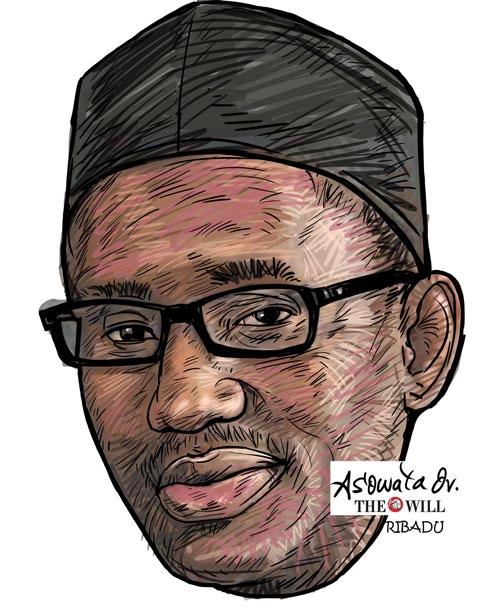
health and life insurance coverage that offers security to the families of serving personnel.
Such support allows them to perform their duties without fear of the unknown. These measures will not only motivate the forces but also attract more qualified individuals to join the ranks, thereby strengthening Nigeria’s security apparatus.
While celebrating the successes, it is also crucial to address areas of concern. Reports have emerged of security forces mistreating civilians, media personnel, civil rights activists and critics. Instances include the arrest of journalists and the crackdown on peaceful protesters.
Such actions undermine the democratic principles that Nigeria stands for. The media and civil society play a vital role in holding power to account and should be protected, not persecuted. Security agencies must operate within the confines of the law, respecting human rights
and upholding the freedom of expression.
The fact remains that even with the best intelligence, strategic planning, preparations and air strikes, collateral damages are extremely difficult to avoid. Yet, the unfortunate events in Sokoto serve as a poignant reminder of the need for precision and caution in military operations. It is essential for the military to review and refine their operational protocols to prevent civilian casualties. Implementing advanced surveillance technologies and conducting thorough intelligence assessments can aid in achieving this goal. Nigeria has made commendable strides in enhancing security, as evidenced by the peaceful festive season. This progress is a testament to the dedication of our security agencies and their leadership. Still, it is imperative to balance security measures with the protection of human rights. By supporting our security personnel and holding them accountable, Nigeria can continue on the path toward lasting peace and security. As citizens, it is our collective responsibility to support these efforts, advocate for justice, and strive for a nation where peace and freedom coexist harmoniously.
In the light of the Sokoto incident, it is crucial for the military to conduct a thorough investigation to understand the factors that led to the unintended civilian casualties. Such an inquiry would not only provide closure to the affected families but also serve as a learning opportunity to prevent future occurrences. Transparency in this process will help rebuild trust between the military and the civilian population, ensuring that collaborative efforts in combating insurgency are not undermined.
Furthermore, the Federal Government should consider implementing community engagement programmes where security agencies can interact with local populations. Such initiatives will foster mutual understanding, allowing security forces to gain valuable insights from residents who are often the first to detect unusual activities in their areas. This grassroots approach can enhance intelligence gathering and ensure that operations are more accurately targeted, minimising the risk to innocent lives.
It is also imperative to address the underlying socio-economic factors that contribute to the rise of insurgent groups. Poverty, unemployment, and lack of education are among the root causes that make individuals susceptible to recruitment by extremist factions.
By investing in education, creating job opportunities and improving living standards, the government can reduce the appeal of insurgent ideologies and promote long-term peace and stability.
While the peaceful festive season is a milestone worth celebrating, the Sokoto airstrike tragedy serves as a sobering reminder of the challenges that remain as Nigeria moves to restore the north to its past glory and agricultural boom.